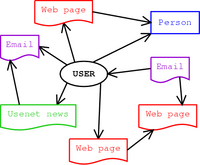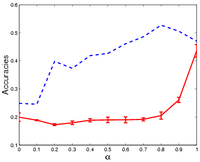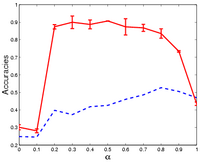
| Personalisation of information access |
|
|
|
|
| RME Home |
| DCS Home |
| Research |
| Teaching |
| Publications |
| Contact |
|
|
| Email me |
Michelle Fisher and Richard Everson
|
Information overload is a serious problem in many aspects of our
lives, particularly when accessing information using computers -- we spend far
too much time accessing information rather than using it. This research is
concerned with solutions to this growing problem based on the personalisation
of information access tasks. Unsupervised learning techniques, namely
probabilistic latent variable models, are developed to automatically
represent, learn and track a user's changing interests from the hypertext
documents that the user views, creates or updates whilst at their computer.
The models are tested on documents collected, over a two year period, from four users. Results are given which demonstrate that the models can be used to personalise information access tasks. The tracking model is quantitatively tested on collections where the interests are known and retrospective analysis is used to demonstrate the ability of the model to track real user's interests. As well as containing content information, documents collected from users also contain a great deal of link connectivity information. In order to take advantage of this connectivity information, a broader definition of links is developed and employed. In addition, we discover the characteristics of links within a collection necessary for the effective combination of term and link information; a collection must have a sufficiently high density of high quality links. The utility of links and the benefits of employing a broader definition of links are investigated, using document classification, on a webpage collection, a collection of academic papers and a collection of email-type documents. |

|
Michelle Fisher has recently completed a PhD on this subject entitled Anticipating and adjusting to users: Experiments in information access. Some relevant papers are
- M.J. Fisher, J.E. Fieldsend and R.M.Everson, Multi-objective optimisation for information access tasks. ACM Transactions on Information Systems, 2004. (Under review.) (Abstract)
- M.J. Fisher and R.M. Everson, Representing interests as a hyperlinked document collection. In: Twelfth International Conference on Information and Knowledge Management (CIKM'03), New Orleans, 2003. (Abstract)
- M.J. Fisher and R.M. Everson, When are links useful? Experiments in text classification. In: Advances in Information Retrieval. 25th European Conference on IR Research, ECIR 2003., F. Sebastini (Ed.)41-56, Springer, Pisa, Italy, April, 2003. (Abstract)

